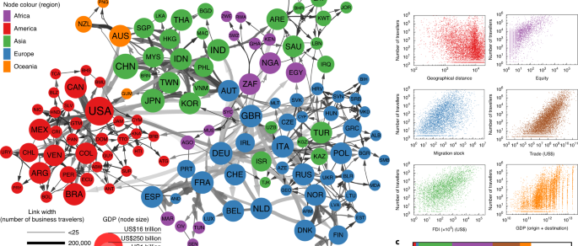Knowledge diffusion in the network of international business travel | Nature Human Behaviour

We use aggregated and anonymized information based on international expenditures through corporate payment cards to map the network of global business travel. We combine this network with information on the industrial composition and export baskets of national economies. The business travel network helps to predict which economic activities will grow in a country, which new activities will develop and which old activities will be abandoned. In statistical terms, business travel has the most substantial impact among a range of bilateral relationships between countries, such as trade, foreign direct investments and migration. Moreover, our analysis suggests that this impact is causal: business travel from countries specializing in a specific industry causes growth in that economic activity in the destination country. Our interpretation of this is that business travel helps to diffuse knowledge, and we use our estimates to assess which countries contribute or benefit the most from the diffusion of knowledge through global business travel.
The authors acknowledge financial support from the Mastercard Center for Inclusive Growth. The funders had no role in study design, data analysis, decision to publish or preparation of the manuscript. The Mastercard Center for Inclusive Growth provided access to the anonymized and aggregated data on expenditures through foreign corporate cards described in section 1.1 of the Supplementary materials. We thank the following people for comments and help in preparing the manuscript: A. Stansbury, D. Bahar, B. Zuccolo and S. Ravinutala. The authors.
The Mastercard Center for Inclusive Growth provided access, subject to strict privacy and data protection safeguards, to an aggregated and anonymized dataset relating to corporate credit card foreign spend. The Center reviewed the paper to ensure that it complied with these privacy and data protection safeguards. However, the Center did not determine any parts of the design, execution or interpretation of the research: all opinions, findings, and conclusions or recommendations expressed in this paper and its Supplementary Informationare those of the authors and do not necessarily reflect the views or opinions of Mastercard. R.H. is a senior fellow at the advisory council of the Mastercard Center for Inclusive Growth.
